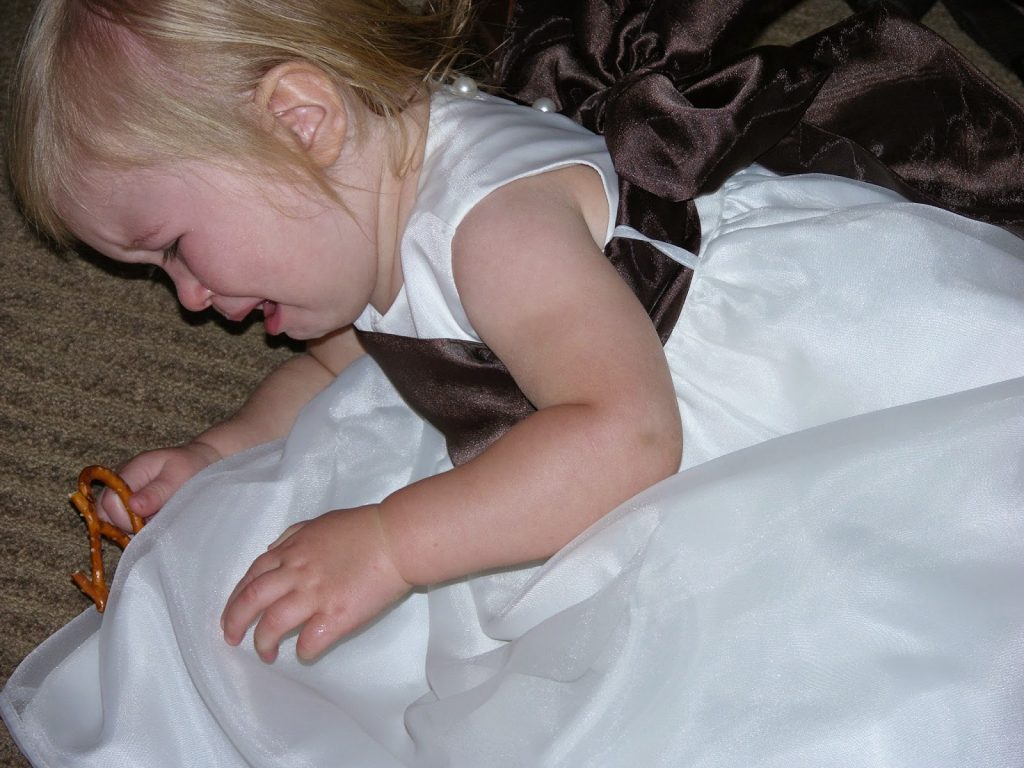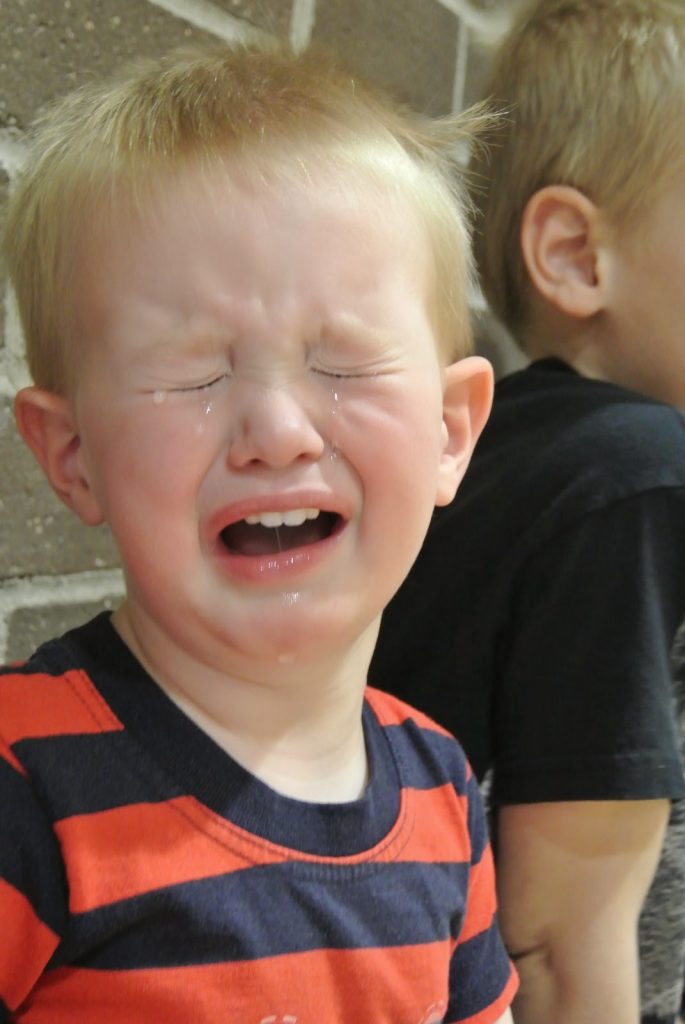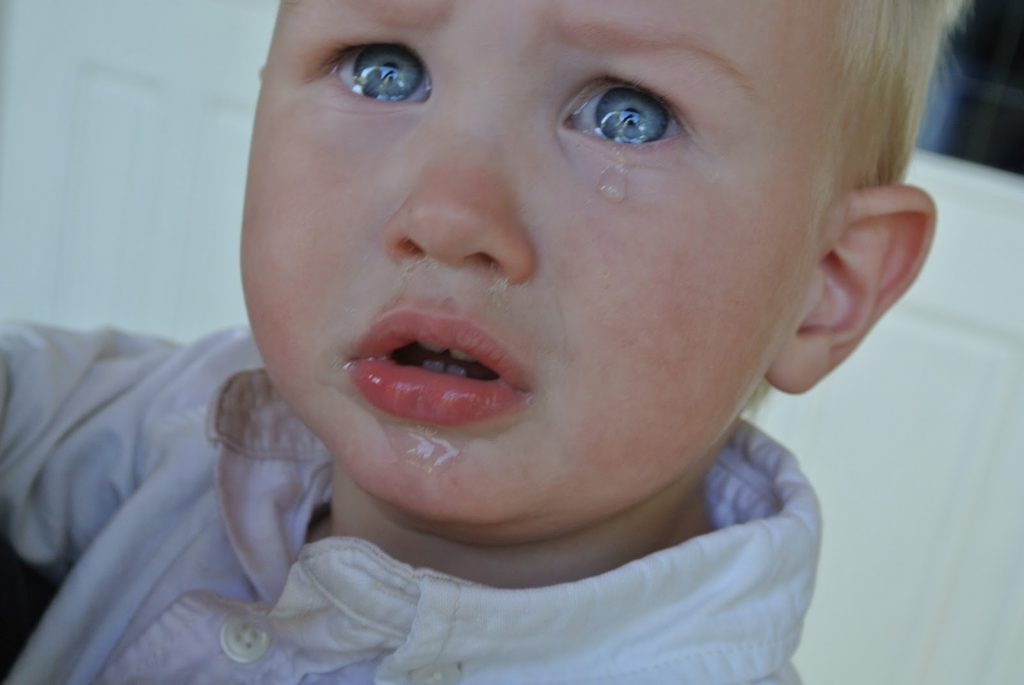I got this mailbag question a week or so ago, and responded to it. Since then, my Cryin’ Babies Go To Bed post was shared on a parenting forum, to GREAT misunderstanding, confusion, concern, and general unpleasantness. Sometimes I kind of forget that my blog is available to, ya know, the whole wide world. I write for you guys who know me and have read a fair number of posts and “get” me and “get” the tone of my blog. But I can see how someone who was reading it in a vacuum would be left wondering at my advice (or, I should say Frankie’s?).
Anyway, I stand behind what I wrote in that post, and I use the techniques I mention in it every single day. I think my kids are happier and more well-adjusted and nicer to be around because of it. But I want to clarify that I do not encourage or practice the stifling of emotions. I do not deny their existence or their importance. Nor do I deny the reality of physical pain.
However.
I have noticed that almost all grownups can stub their toe or get a paper cut and NOT dissolve into a writhing puddle of shrieks on the floor. I have noticed that the same cannot be said of many children. So, at some point between two and thirty, we learn how to process physical pain in a less dramatic way. I just figure, why not do it closer to two? Isn’t it nicer to have that under control?
Similarly, I want my children to be able to experience and acknowledge strong emotions without making themselves and the people around them miserable.
 |
| this is Betty, in case you’re wondering how Lulu suddenly got to be 18 months old |
There are legitimate reasons for kids to be sad, or mad, or frustrated. Absolutely there are. But in MY experience with MY kids, most of the reasons that they are having strong emotions are not particularly legitimate. I think it’s okay to help them realize that. It works for grownups too. Just last week, a lady at the grocery store took the last box of Magnum Mini Gold Bars, right before my very eyes. And I managed, by carefully implementing the strategies outlined in the Cryin’ Babies post to NEITHER punch her, NOR burst into tears, NOR go running to the store manager to tattle on her. Victory! And you know what, I didn’t feel stifled, I felt empowered. That’s what I want for my kids.
And now back to our regularly scheduled MAILBAG, which just happens to be on the same subject!
Hi Kendra,
I was hoping you could help me with a bit of a situation with my 18 month old little boy. He is my second child, first boy, and he’s going through a terrible phase right now. He cries almost incessantly, sometimes to be picked up, sometimes to be given something, sometimes for no discernible reason. I have read your posts on discipline for young babies and have tried using “not for babies” (which only seems to make him cry) and “crying babies go to bed” (which makes him scream bloody murder). I’m just wondering what to do with him. He has such a strong will, much stronger than his older sister and I feel I’m in over my head. He has now taken to hitting everything and everyone, but mostly me, whenever he feels thwarted and occasionally leaning in to bite. He hasn’t bitten down on anyone yet, just leaned in to do it, but it’s not a habit that I would like him to develop. I feel like everything I’ve tried has made him (and me) more angry, frustrated and upset and I’m getting twitchy from all the endless screaming.
This kid is capable of screaming without break for a full hour (he probably could do more but I’ve never had the heart to find out). That’s why it’s hard to do a time out in the crib because there’s no discernible time when he calms down enough for me to go in and take him back out. I’m not really sure where to go from here because sometimes I feel like I should crack down and put him in time out every time he hits and sometimes I feel like I’m just making life hard on us and should just ignore the whole thing until it blows over. I want to be consistent but I just don’t know whether to consistently correct or consistently ignore.
Thanks,
M
Dear M,
Ugh. That is hard. I’m so sorry. My oldest was really hard for me to handle at that age, so I’ve been there, for sure. I felt like my whole life, our whole family’s life, was lived at the whims of a toddler. I got a do over with Frankie, my number six. He was also a very willful toddler. I handled him in a less emotional way, and for me, it was much more successful.
Mostly, it really does just comes down to what you WANT to do. I think that consistently correcting OR consistently ignoring will both work eventually. It’s what you can live with and what you can’t. If letting him flip out is less disruptive to your life than trying to outlast him, then I agree with you . . . it probably WILL blow over eventually. I don’t know for sure, because I CAN’T handle it. So I always fix ’em.
Now, his level of maturity is going to matter a lot here. I don’t have an 18 month old right now, I have a ten month old and an almost three year old. If my ten month old was fussy and clingy and cried a lot, I would put her down as often as I had to for my own sanity and bare minimum productivity, and so she could get some sleep, but mostly, if she needed to be held, I would hold her. I would interpret her fussing as coming from a place of need and I would do my best to meet her need without going crazy myself.
If, however, my two and a half year old was clinging and shrieking and biting and hitting. I would view that not as a need, but as being a menace, and I would do everything in my power to correct the behavior and make him a person who was pleasant to be around. I’d do it for my own good, and his own good, and the good of our family. So if he was to scream his head off in a time out, I’d wait him out. I’d calmly go in every half hour or so to tell him that we miss him and hope that he’ll be able to calm down soon. But, he wouldn’t get out until he stopped. I’d be more stubborn than he was. I’d figure that, eventually, he would decide he’d rather knock it off and be a part of our family.
As long as he thinks it’s going to get him what he wants, he’s going to keep screaming. But as soon as he’s convinced that it won’t do any good, he’s probably going to knock it off.
You’re in between those two ages, so you’ve got to decide if he has a legitimate need that’s not being met, or if he is just being a stinker. Then you have to decide what course of action is going to be most liveable for you and your family.
I think what changed everything for me with my oldest son was realizing that HIS being upset didn’t have to upset ME. I don’t know how to write this down without coming across as callous and getting my attachment parenting card revoked, but me allowing myself to get emotionally caught up in all his drama didn’t help either of us.
These days . . . I love my kids, I meet their needs, I take care of them, I spend time with them, I LOVE THEM, LOVE THEM, LOVE THEM but if the toddler is having an off day or week or month, I don’t let him drag me and the rest of the family down with him.
I have reasonable, age-appropriate expectations for behavior. I clearly communicate those expectations to the toddler. “No screaming. If you scream again, you’re going to go sit in your crib.” Then, I follow through in a calm but firm way. Attached to the child, but detached from the drama.
If he screamed again, I’d say, “Uh oh, you screamed again. No, no screaming. You’re going to go sit in your crib until you can calm down.” Then I’d scoop him up, and put him calmly in his crib, no matter how much fuss he made. I’d say, “I’ll come back to get you once you’ve settled down.”
Then I’d leave and not fret about it. He’s going to be okay. If he was throwing a long tantrum, I’d check in, calmly and sympathetically, every so often, to remind him that once he’s settled down, he can come back and join the family. Then once he was calm, I’d get him out and remind him, “No screaming. If you can’t remember, you’ll end up right back in here.”
If it’s an established habit, I might give him a couple of warnings, but, really, if you want to change the behavior, it might be easiest to just keep on him about it and get it over with.
As long as he is developmentally capable of the behavior, (at eighteen months I’m pretty sure all my kids have been capable of learning to not throw fits, but you’ve got to make that judgment) calm, firm, and consistent should work to change the behavior over the course of a few weeks.
I think it’s key to really believe that you and the rest of the family are reasonable to expect a level of peace within your home. And to believe that your kids are capable of living up to a high standard of behavior. Sometimes there will be screaming and chaos, there is in any home with children, there is in my home for sure. But we don’t have to resign ourselves to it.
I think what made me hesitant to enforce rules like this with my first was the idea that it was wrong somehow to “punish” him for his “feelings.” But I know now that that’s not what I’m doing. He is allowed to have any feeling there is, but what he’s not allowed to do is not know how to control those feelings and lash out at me or his siblings. Me not tolerating constant emotional outbursts has meant my kids have learned to be the boss of their own reactions to situations. They are allowed and even encouraged to have feelings and preferences, and to stand up for themselves, but in a way that isn’t destructive to themselves or our family. They are not perfect, but they’re pretty good. In a house with nine people living in it, we are at a liveable level of emotions, probably 80% of the time.
The other 20% of the time, we’ve got one or more of those nine people off having some alone time to compose themselves. Sometimes one of those people is me. It’s a good skill to have.
I hope that helps, and both of those posts you mentioned have specific things that have worked for me in dealing with your situation.
Here are links to some of my posts about parenting toddlers:
HOW TO BE THE BOSS OF A ONE YEAR OLD
Trust your mama gut. It will guide you!
Disclaimer: I am not a theologian, nor am I an official spokesperson for the Catholic Church. (You’re thinking of this guy.) If you read anything on this blog that is contrary to Church teaching, please consider it my error (and let me know!). I’m not a doctor or an expert on anything in particular. I’m just one person with a lot of experience parenting little kids and a desire to share my joy in marriage, mothering, and my faith.
If you’ve got a question, please send it along to helpdesk@catholicallyear.com. Please let me know if you prefer that I change your name if I use your question on the blog.







